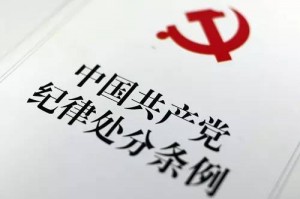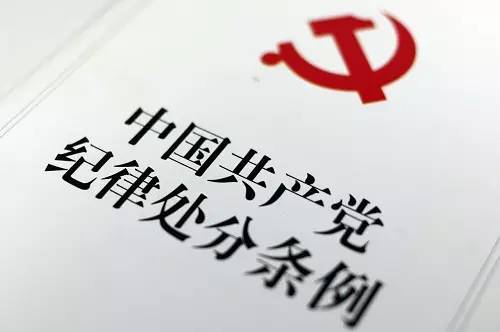The Word of the Week comes from the Grass-Mud Horse Lexicon, a glossary of terms created by Chinese netizens and encountered in online political discussions. These are the words of China’s online “resistance discourse,” used to mock and subvert the official language around censorship and political correctness.
wàngyì Zhōngyāng 妄议中央

Party Standards on Integrity and Self Restraint. (Source: China News Service)
To question the reasoning of the central government; to provoke the online censors.
The Chinese Communist Party Standards on Integrity and Self Restraint, released on October 12, 2015, stipulate that Party members must not “improperly discuss the fundamental policies of the central government and violate the unity of the Party” (妄议中央大政方针,破坏党的集中统一). The infraction gained currency when Xinjiang Daily editor Zhao Xinwei was fired on the grounds that he “improperly discussed” government policy in the region on November 3.
Netizens may now invoke the phrase when a post is blocked. For instance, on November 4, 2015, Weibo user Luoyameng (@罗亚蒙) attempted to repost the headline “No Performers with Moral Flaws in Next Year’s Spring Festival”:
Luoyameng (@罗亚蒙): Funny, this Weibo post doesn’t “improperly discuss” the central government. It’s just about entertainment. But they won’t let me repost it.
奇怪,这条微博也没“妄议”中央,就是说点娱乐圈的事儿,居然不让转了 (November 4, 2015) [Chinese]
See also Crotch Central Committee.
![]() Can’t get enough of subversive Chinese netspeak? Check out our latest ebook, “Decoding the Chinese Internet: A Glossary of Political Slang.” Includes dozens of new terms and classic catchphrases, presented in a new, image-rich format. Available for pay-what-you-want (including nothing). All proceeds support CDT.
Can’t get enough of subversive Chinese netspeak? Check out our latest ebook, “Decoding the Chinese Internet: A Glossary of Political Slang.” Includes dozens of new terms and classic catchphrases, presented in a new, image-rich format. Available for pay-what-you-want (including nothing). All proceeds support CDT.








